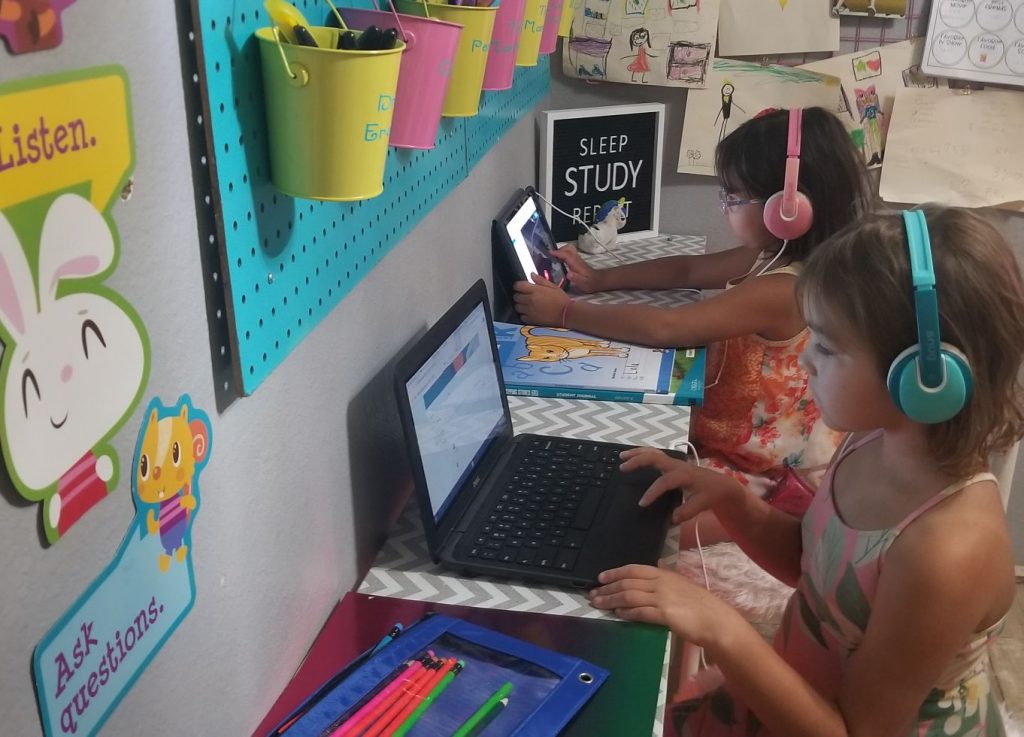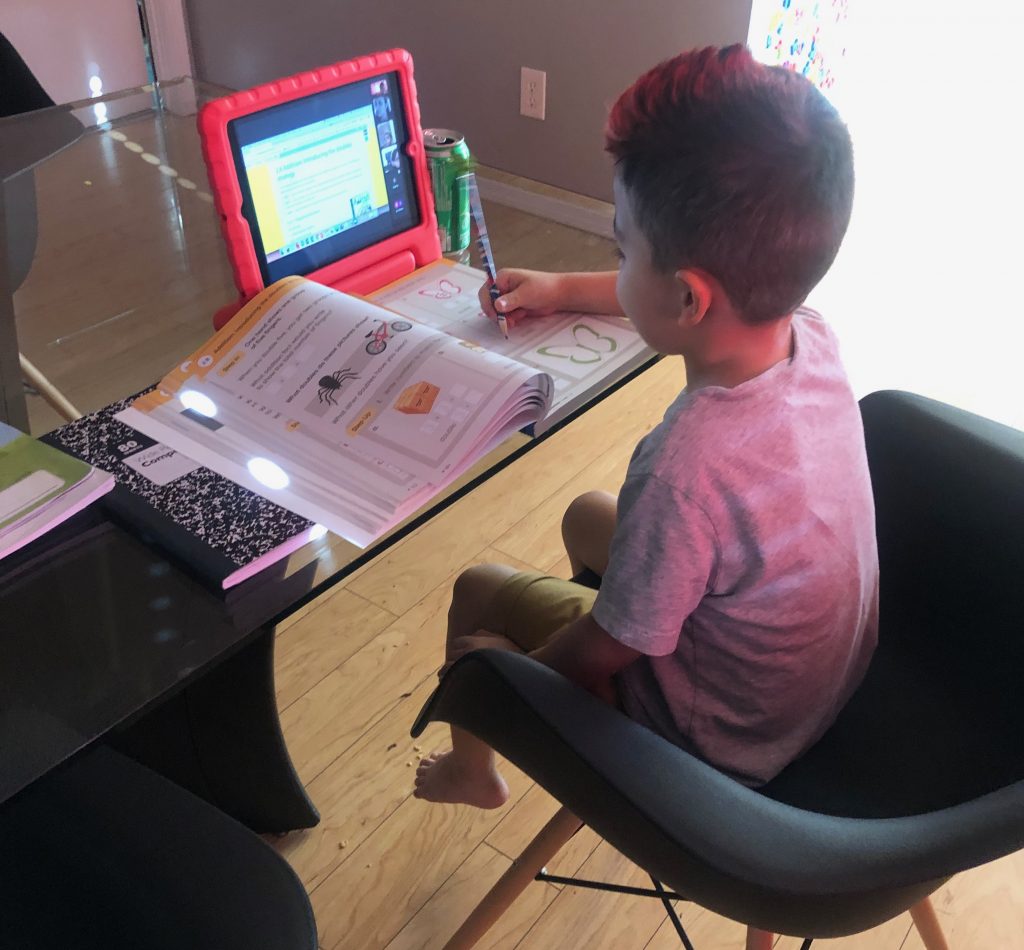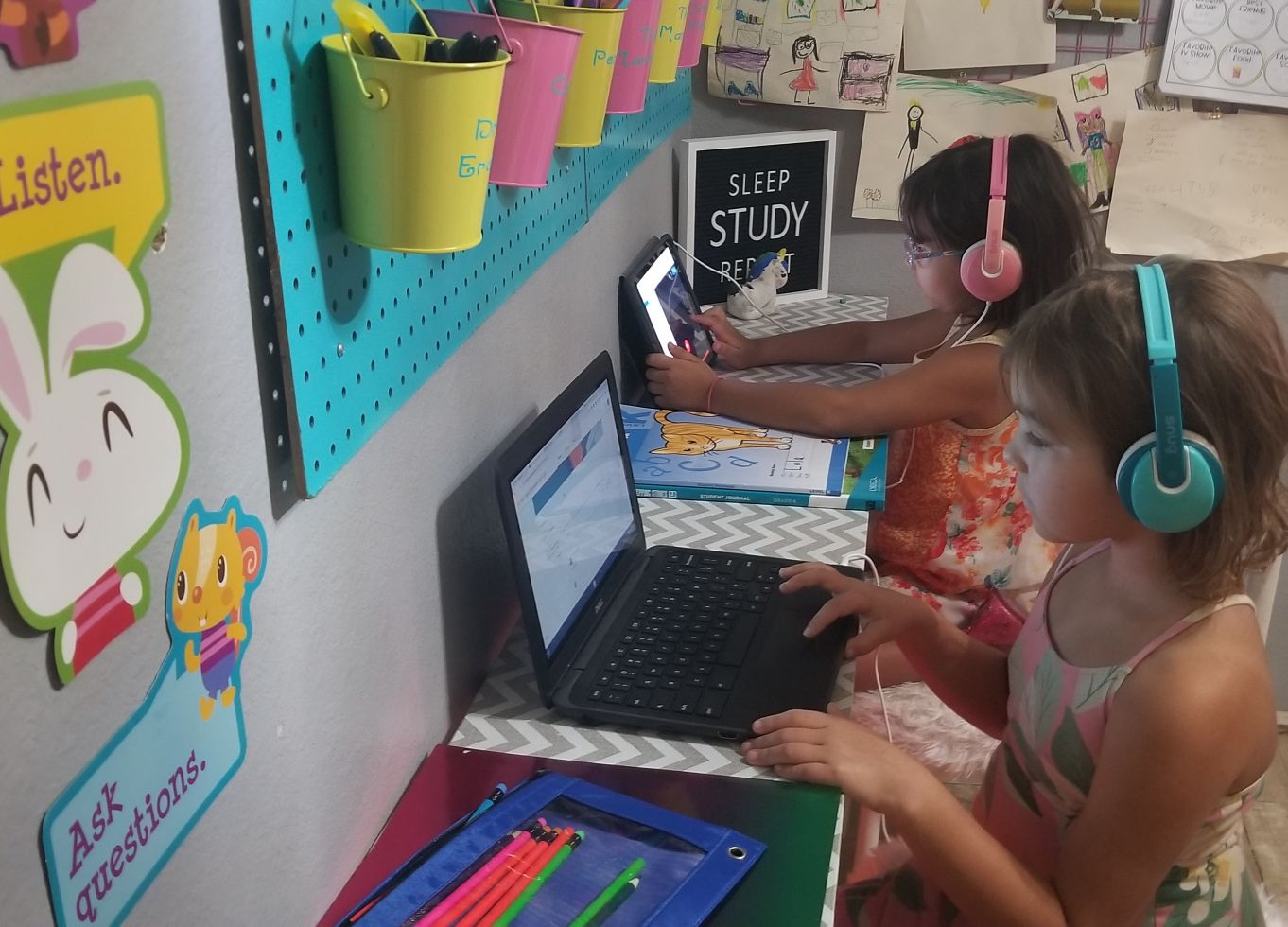By Alika Medina and Mariah Perry / NM News Port
Albuquerque Public Schools (APS) have deployed a sweeping array of online tools and resources to help nearly 84,000 students from 143 schools learn at home during the coronavirus pandemic. Many students and parents are struggling with the technology and administrators admit remote learning isn’t the same as in-person instruction.
Amanda Miller, a mom of two elementary school girls, had difficulties right out of the gate when APS cancelled all in-person learning and moved online for the fall semester.
“The iPad was glitching for the first two weeks,” Miller said, which caused one of her daughters to miss assignments. “She didn’t get to submit a lot of her assignments and the way teachers are doing attendance is by submitting assignments.”
Another parent, Andrea Jaramillo, mother of elementary student Andrew Jaramillo, said keeping the school-provided iPad battery charged and working is half the battle.
“For the most part the iPad works fine except for the days where the weather is funky,” Jaramillo said. “I mean they die just because they are in class for two hours straight — but if he ends the class or it is lunch period or something like that we make sure we charge it.”

Richard Bowman, chief information and strategy officer at APS, said that ideally all students would get Chromebooks, but that isn’t feasible.
“If I could give everyone Chromebooks, I would, but we can not do that due to supply issues,” Bowman said.
Bowman says the district distributed 18,000 both chromebooks and iPads to students last spring, and amassed another 45,000 to distribute this fall.
“When the pandemic happened, we decided to look through our inventory list to see how many devices we had at the schools. We had just enough iPads for kindergarten through third grade. This is why we decided to give them the iPads,” Bowman said.
He said the rest of the students in the upper grades were issued Chromebooks, a simplified laptop made by Google.
As for technical issues, Bowman said APS is asking that parents find time to bring in any devices that are having problems so they can be looked at.
“If the technology is broken, we are asking that the parents bring it in and we can either replace the device or issue a new one,” Bowman said.
The district has had to ramp up its technology division like never before to handle the crush of student, parent and teacher needs.
On its website, APS promises, “Educational Technology supports the APS community with the effective integration of technology through planning and professional development so all learners have authentic and self-directed learning experiences in a secure digital environment.”
Students and their parents have a vast array of tools, apps and resources to navigateThere are videos and webinars to walk everyone through the options.
Bowman said the school-issued devices do not come with all the applications pre-loaded, so families have some technical preparations to do at home.
“They do not come with the apps already installed; they come with an APS inventory which is like an app store, in a way, but it basically has all the software and you just click on the ones you need and they will automatically download to your device,” Bowman said.
The apps include Google Classroom, Edgenuity, Seesaw, Gmail, Google Calendar, Drive, Docs and Sites.
GoGuardian Parent is a mobile app that helps keep parents aware of their children’s activity on school-issued Chromebooks and provides additional controls during out-of-school hours.

“Luckily we haven’t had issues with the iPad,” Chelsea Maldonado, mother of first grader Sebastian Gallegos, said.
Maldonado said she’s heard that other kids in her son’s class are having problems with the iPads not charging.
“I feel bad because they will tell their teacher that it is going to die and they tell the kids to charge it and the kids are like it is in the charger and it is not charging,” Maldonado said.
Maldonado suspects some parents are using technological issues as an excuse.
“Some parents are saying that their devices are broken because they die,” Maldonado said. “I feel like that is another excuse that parents are using just so they don’t have to be in class.”
Meanwhile, children with special needs require additional support.
“It is a change for everyone especially with my son’s special education because they still have to cater to each of their needs towards their individualized education program,” Jaramillo said.
But Jaramillo said she understands everyone is struggling with the transition to online learning.
“I think this is hard on everybody right now,” Jaramillo said. “It is just something new that we all have to get used to. Even the teachers are having to get used to it.”
APS claims most technology complaints have been resolved. The only ones not settled are the complaints that everyone wants Chromebooks, Bowman said.
“We simply can not do this,” Bowman said. “Because of the pandemic, there has been a shortage of supply.”
“(APS) has been good with the technology and understanding that it’s not going to be good all the time.”
– Amanda Miller, mother to two elementary school children
Beneath the concerns over technology and adapting to online learning are fears about children falling behind.
During a school board meeting on Oct. 7, APS interim superintendent Scott Elder admitted there is a gap between where students are and where they should be academically.
“The underlying principle here is that these kids are not coming in at the normal place they were. We know there was some learning loss. I don’t agree with the Legislative Finance Committee that it was a full year but I do think they lost some learning,” Elder said.
The New Mexico Legislative Finance Committee, which provides research for the state legislature, released findings that children are losing ground faster than some might think.
“Though necessary to combat the spread of COVID-19, school closures and issues with remote learning will likely lead to New Mexico’s children losing the equivalent of three months to an entire year of learning,” the committee reported “This loss is expected to impact younger, at-risk children more.”
Elder said teachers have to take these academic losses into consideration.
“We have to spend some time in the beginning of the year to figure out where they are and then meet them where they are,” Elder said. “And so you are not going to be grading and teaching the same as you were at this time last year. It’s going to have to look different.”
APS advises families to keep to a daily schedule when it comes to remote learning. Teachers have set up their days to go through instruction and social-emotional education, as well as providing time for breaks. Students are required to receive a minimum of three hours of online lecturing.
“The two girls were always falling behind,” Miller said. “I think recorded lessons would help significantly especially for the working parents.”
Miller is a full-time college student who also works full time, which makes it difficult for her to keep up with her childrens’ assignments.
“I know they are falling behind because they don’t attend everything and there’s no makeup or recorded lectures, so it’s been hard,” Miller said.
Maldonado has a similar view.
“You can tell they are worried about students falling behind,” Maldonado said.
APS chief information and strategy officer Bowman said although remote learning is a challenge, it wouldn’t even be possible without technological advancements.
“Technology has helped improve learning during this pandemic,” Bowman said. “If you think back 10 years ago, we would not be able to do what we are doing now. We would be left with the choice to go to school and possibly become deathly ill.”
Mariah Perry and Alika Medina are reporters for the New Mexico News Port. They can be reached at nmnewsport@gmail.com, or on Twitter @MariahP93714334 and @Medina_Alika.
